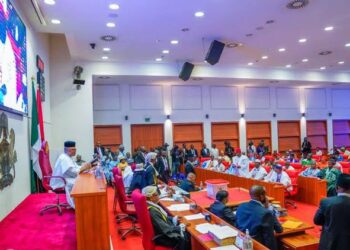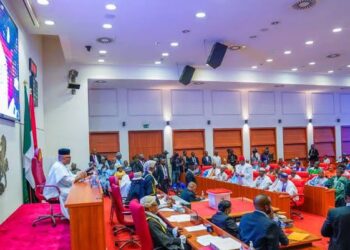The Nigerian Senate which rejected the budget deficit proposal by the Minister of Finance last week disclosed that it plans on tackling it through an amendment of the Finance Act.
This was disclosed by Chairman, Senate Committee on General Services, Sen. Sani Musa (APC Niger-East) on Sunday in Abuja, according to NAN.
He added that the FG needs to urgently look for alternative funding for the budget away from hydrocarbons.
What the Senate is saying
Senator Musa stated that Nigeria urgently needs to look into other areas beyond crude oil, to generate revenue to fund the budget and ultimately reduce the deficit in the budgetary provision.
“The budget of this country has been in deficit and the only thing we can do is to amend so many things in the Finance Act,” he said.
He noted that this would enable the generation of more revenues from other sources rather than depending on oil alone and by extension, reduce the size of the proposed budget deficit.
He said the ninth Senate had done creditably, given the laudable bills passed to improve the economy, adding that the renovation of the National Assembly complex was also a steering achievement of the ninth Assembly.
Nairametrics reported last week that the Senate disagreed with the Minister of Finance, Budget and National Planning, Zainab Ahmed, and heads of some revenue generating agencies under the ministry on the 2023–2025 Medium Term Expenditure Framework and Fiscal Strategy Paper (MTEF/FSP) which proposed a N12.43 trillion deficit and N6 trillion tax and import duty waivers in the N19.76 trillion budget.
Ahmed had told the committee that the proposed N19.76 trillion budget for 2023 would have a deficit of N12.43 trillion as a result of projected N6 trillion tax credit and import duty waivers as well as fuel subsidy of over N6 trillion if retained for the whole year.
What the Senate committee said
- Senate Committee on Finance, led by Senator Olamilekan Adeola, said, “The proposed N12.43trillion deficit for the 2023 budget and N6trillion waivers are very disturbing and must be critically reviewed. Many of the beneficiaries of the waivers are not plowing accrued gains made into expected projects as far as infrastructural developments are concerned.
- “The same goes for the tax credit window offered by FIRS to some companies. Billions and trillions of naira can be generated by the government as revenue if such windows are closed against beneficiaries abusing them and invariably provide the required money for budget funding with fewer deficits cum borrowings.
- “The Nigeria Customs Service should help in this direction by critically reviewing waivers being granted on import duties for some importers just as the FIRS should also review the tax credit window offered to some companies without corresponding corporate social services to Nigerians in terms of expected project executions like road construction.’’

























